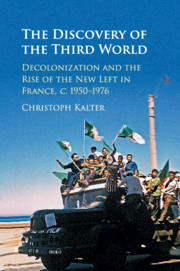Book contents
- Frontmatter
- Contents
- List of Figures
- Preface
- Acknowledgments
- Abbreviations
- 1 Introduction: From “Discovery” to Historiography
- 2 A New Concept of the World: The Third World in the Social Sciences and Politics
- 3 Conflicts, New Diversity, and Convergence: The New Radical Left in France
- 4 “From the Résistance to Anticolonialism”: The Politics of Memory in the New Radical Left
- 5 “Today We Have to Learn a Lesson from Them”: The Journal Partisans and the Opening Up to the Third World
- 6 “With Socialist Greetings”: The PSU, the Cedetim, and the Praxis of “International Solidarity”
- 7 Conclusion: Eyes on the World
- Appendix
- Bibliography
- Index
1 - Introduction: From “Discovery” to Historiography
Published online by Cambridge University Press: 05 September 2016
- Frontmatter
- Contents
- List of Figures
- Preface
- Acknowledgments
- Abbreviations
- 1 Introduction: From “Discovery” to Historiography
- 2 A New Concept of the World: The Third World in the Social Sciences and Politics
- 3 Conflicts, New Diversity, and Convergence: The New Radical Left in France
- 4 “From the Résistance to Anticolonialism”: The Politics of Memory in the New Radical Left
- 5 “Today We Have to Learn a Lesson from Them”: The Journal Partisans and the Opening Up to the Third World
- 6 “With Socialist Greetings”: The PSU, the Cedetim, and the Praxis of “International Solidarity”
- 7 Conclusion: Eyes on the World
- Appendix
- Bibliography
- Index
Summary
A Discovery and Its Consequences
The protests of 1968 were still reverberating in France and around the world when development economist Ignacy Sachs published an in-depth essay in Paris in 1971. In it, Sachs described decolonization as a dramatic rupture in the intellectual history of the recent past. The wave of liberations in the colonies after the Second World War, he argued, had destroyed an entire world view. Beginning with the Age of Discovery, Europeans had seen themselves as the civilized and ruling center, and all others as inhabitants of a barbarous periphery dominated by Europe. Now, however, this Eurocentrism borne by cultural arrogance and racist stereotypes was at an end once and for all. The responsibility for this revolution in perceptions, Sachs maintained, lay with the tiers monde, the Third World – a term demographer Alfred Sauvy had coined in Paris in 1952, and which had spread rapidly from what was then the world capital of intellectual life. Soon the term was used all over the world to describe the (formerly) colonized, non-aligned, and supposedly underdeveloped societies of Asia, Africa, and Latin America. Ignacy Sachs titled his 1971 essay after their rediscovery as the Third World: La découverte du tiers monde.
This book is also about this discovery. It investigates its preconditions and its course, its intellectual and political repercussions. Among those repercussions was the emergence of the New Radical Left. More or less contemporaneously with the idea of the Third World, the New Radical Left developed in various Western countries from the beginning of the 1950s. This Left moved outside of the established organizations of social democracy and communism and was a keen rival to both until the 1970s. In the process, radical anticolonialism was its most important distinguishing characteristic. The New Radical Left played a crucial role in the discovery of the Third World that took place in equal measure in the social sciences, politics, media, and everyday life, and that unfolded its effects all over the world. At the same time, it was a consequence of this discovery and would not have existed without it.
- Type
- Chapter
- Information
- The Discovery of the Third WorldDecolonisation and the Rise of the New Left in France, c.1950–1976, pp. 1 - 33Publisher: Cambridge University PressPrint publication year: 2016



